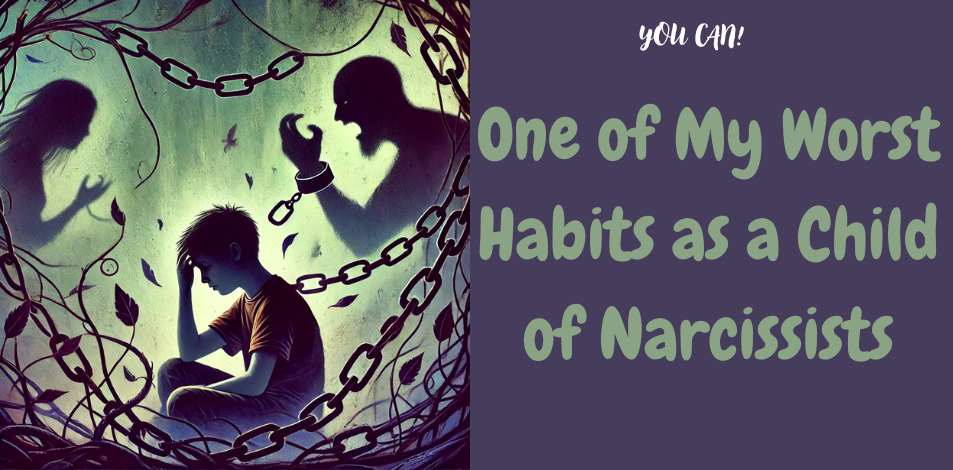
Growing up with narcissistic parents can leave deep emotional scars, and one of the most pervasive effects is the development of unhealthy habits. These habits, often rooted in survival mechanisms, may have helped us navigate the complexities of childhood, but they often hinder personal growth and emotional well-being in adulthood. For me, one of the worst habits I developed as a child of narcissists was people-pleasing.
The Origins of People-Pleasing
In a narcissistic household, a child’s needs, emotions, and identity are often overshadowed by the parent’s constant demands for attention, validation, and control. As a child, I learned that my worth was tied to how well I could meet my parents’ expectations. I adapted by becoming hyper-attuned to their moods and desires, always striving to make them happy, even at the cost of my own well-being.
Related : Heal by Seeing the Narcissist as Your Mirror
People-pleasing became my coping mechanism. It was a way to avoid conflict, criticism, and the emotional abuse that would follow if I didn’t comply. In my mind, being agreeable and accommodating was the only way to survive in a world where love was conditional.
The Impact in Adulthood
This habit of people-pleasing didn’t stay confined to my childhood home. It followed me into adulthood, affecting my relationships, career, and self-image. I often found myself saying “yes” when I wanted to say “no.” I overextended myself, taking on responsibilities that weren’t mine, just to avoid disappointing others. This led to chronic stress, burnout, and resentment.
The worst part? I didn’t even realize I was doing it. People-pleasing felt like second nature. I thought I was being kind, generous, and accommodating, but deep down, I was driven by fear—fear of rejection, abandonment, and conflict.
The Emotional Toll
People-pleasing isn’t just about avoiding conflict; it’s about losing yourself. Over time, I began to lose sight of who I was. I didn’t know what I truly wanted or needed because I had spent so much time focusing on other people’s desires. My self-worth was entirely dependent on external validation, and when that validation wasn’t there, I felt worthless.
Emotionally, this habit was exhausting. Constantly seeking approval from others left me feeling drained and unfulfilled. Worse, it perpetuated a cycle of attracting toxic relationships—friends, partners, and colleagues who took advantage of my inability to set boundaries.
Breaking the Cycle
Healing from the habit of people-pleasing required me to confront its roots. I had to acknowledge that this behavior was a response to the emotional manipulation and control I experienced as a child. More importantly, I had to learn that I was no longer that child, and I didn’t need to please everyone to be safe or loved.
Breaking free from people-pleasing meant learning how to assert myself and set boundaries. This was a difficult process. At first, saying “no” felt uncomfortable, even terrifying. I feared that standing up for myself would lead to rejection, just like it had with my parents. But over time, I realized that healthy relationships thrive on mutual respect, not on one person bending over backward to keep the peace.
Self-Worth and Validation
One of the biggest lessons I learned in breaking the people-pleasing habit was that my worth is not tied to how well I meet others’ expectations. True self-worth comes from within, and it’s not something that can be taken away based on whether someone approves of you.
Related : The Reason Narcissists Succeed and You Don’t
Learning to validate myself—rather than seeking constant validation from others—was a key step in my healing journey. This required building self-compassion, acknowledging my own needs, and embracing the fact that it’s okay to disappoint people sometimes. Not everyone will like me, and that’s perfectly fine.
The Road to Recovery
Recovery from people-pleasing is ongoing, but every small victory counts. Each time I set a boundary, speak up for myself, or prioritize my needs, I reclaim a piece of the identity that was overshadowed by my childhood experiences. I am no longer defined by my ability to please others, but by my ability to honor myself.
In conclusion, people-pleasing was one of the worst habits I developed as a child of narcissists, but it doesn’t define me today. By recognizing this behavior as a survival mechanism and working to unlearn it, I’ve gained a stronger sense of self-worth, healthier relationships, and the freedom to live authentically. Healing is possible, and breaking the cycle of people-pleasing is a crucial step on that path.




